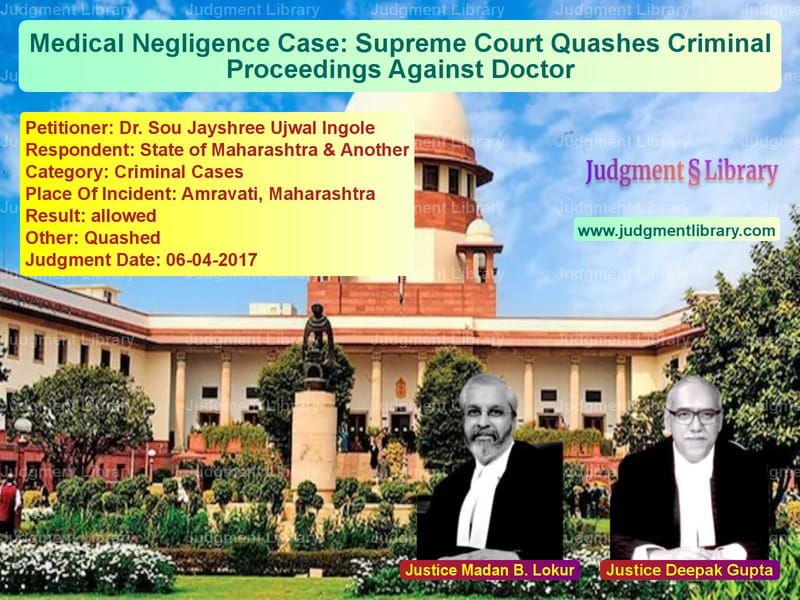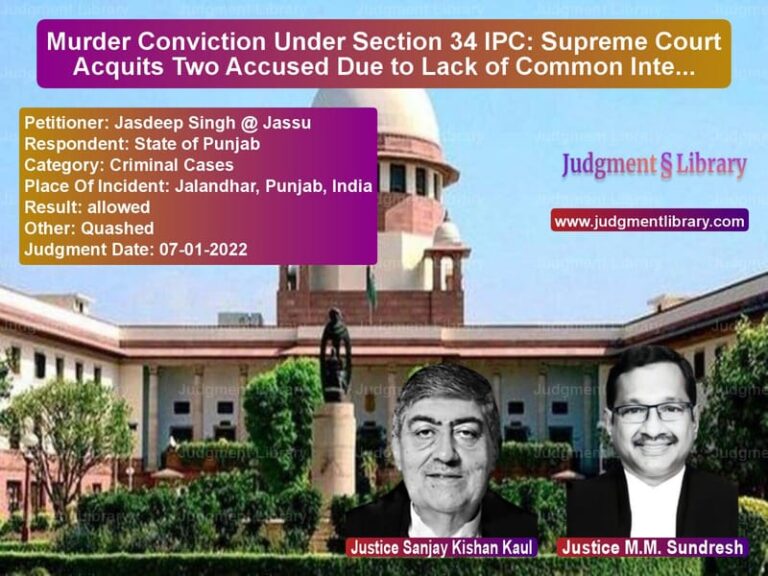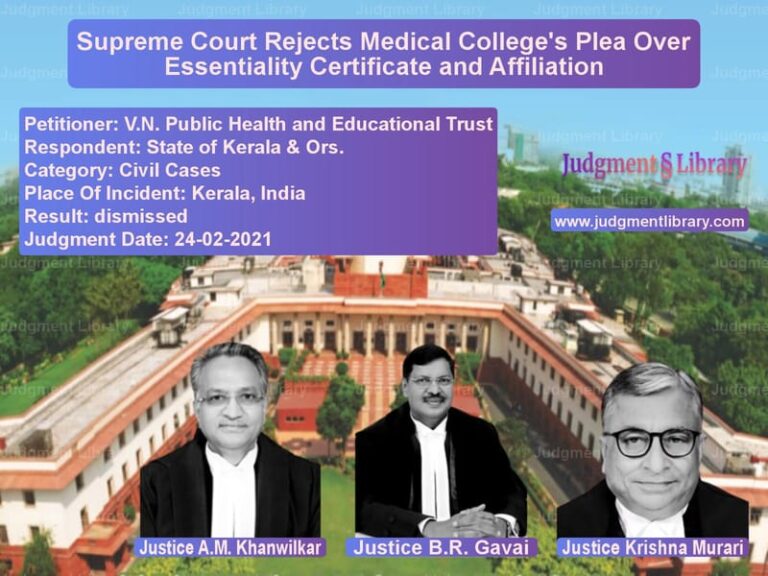Medical Negligence Case: Supreme Court Quashes Criminal Proceedings Against Doctor
The case of Dr. Sou Jayshree Ujwal Ingole vs. State of Maharashtra & Another is a landmark ruling in the domain of medical negligence and criminal liability. The Supreme Court was called upon to determine whether the appellant, a doctor, should face criminal prosecution under Section 304-A IPC for alleged negligence leading to a patient’s death.
The case stemmed from the death of Shrikrishna Gawai, a patient suffering from Haemophilia, admitted to Irvin Hospital, Amravati, on August 29, 1997, after a road accident. The prosecution alleged that the appellant, along with two other doctors, failed to provide necessary medical attention, which led to the patient’s death on September 6, 1997. However, the Supreme Court, after reviewing medical negligence laws and precedents, quashed the criminal proceedings against the appellant.
Background of the Case
The deceased, Shrikrishna Gawai, was admitted to Irvin Hospital, Amravati, on August 29, 1997, after sustaining injuries in a road accident. The patient was known to be suffering from Haemophilia, a condition where blood clotting is impaired, making medical intervention critical.
The treating doctors included:
- Dr. Manohar Mohod (Emergency Medical Officer)
- Dr. Dhirendra Wagh (Attending Physician)
- Dr. Avinash Choudhary (Physician on Call, Accused No. 1)
- Dr. Sou Jayshree Ujwal Ingole (Appellant, Surgeon on Call)
On September 5, 1997, around 9:00 p.m., Dr. Mohod attended to the patient, who complained of abdominal pain. A call was sent to the appellant, Dr. Ingole, who arrived at the hospital, examined the patient, and noted that a Physician be called. She then left the hospital.
The next morning, on September 6, 1997, the patient’s condition worsened, and he passed away. The victim’s brother lodged an FIR, alleging that the doctors’ negligence led to the patient’s death. A criminal case was filed, and departmental inquiries were initiated.
Departmental Inquiry and Criminal Proceedings
- Dr. Mohod was debarred from an annual increment.
- Dr. Ingole was permanently prohibited from entering Irvin Hospital, Amravati.
- Dr. Choudhary was transferred to another hospital.
In the criminal case, Dr. Mohod was discharged due to lack of evidence. Dr. Ingole, however, was charged under Section 304-A IPC for allegedly failing to remain with the patient after calling for a physician.
The appellant filed a petition under Section 482 CrPC to quash the criminal case. The Bombay High Court dismissed the petition, stating that the matter should be decided during trial. The appellant then approached the Supreme Court.
Supreme Court’s Judgment
The Supreme Court, comprising Justices Madan B. Lokur and Deepak Gupta, reviewed the evidence and quashed the criminal proceedings against Dr. Ingole. The key observations were:
- The appellant was a Surgeon on Call and had attended to the patient.
- She examined the patient, found no evidence of internal bleeding, and called for a physician.
- She left the hospital at 11:00 p.m., assuming that the physician would arrive soon.
- No further calls were made by the hospital staff to summon her back.
- The patient was attended by Dr. Mohod the next morning but unfortunately passed away.
Key Excerpts from the Judgment
The Court emphasized:
“A medical practitioner faced with an emergency tries his best to redeem the patient. He does not gain anything by acting negligently.”
On criminal liability, the Court held:
“To prosecute a doctor under Section 304-A IPC, it must be shown that the accused did something or failed to do something which no medical professional in their ordinary senses and prudence would have done or failed to do.”
Legal Precedents Considered
- Jacob Mathew vs. State of Punjab (2005) – Reaffirming that criminal proceedings against doctors should be initiated cautiously.
- Dr. Suresh Gupta vs. NCT of Delhi (2004) – Holding that medical negligence must be “gross” to constitute a criminal offense.
- Dr. Mukhtiar Chand vs. State of Punjab (1998) – Stating that an error of judgment does not amount to criminal negligence.
Implications of the Judgment
- The ruling provides protection to medical professionals from frivolous criminal prosecution.
- It reinforces that criminal negligence must be gross to attract liability under Section 304-A IPC.
- The decision clarifies that an error in judgment does not constitute criminal negligence.
Conclusion
The Supreme Court’s ruling in Dr. Sou Jayshree Ujwal Ingole vs. State of Maharashtra serves as a landmark judgment on medical negligence and criminal liability. The Court reaffirmed that doctors should not be held criminally liable unless their actions reflect gross negligence. The ruling protects medical professionals from undue harassment and ensures that genuine errors in judgment do not result in criminal prosecution.
Don’t miss out on the full details! Download the complete judgment in PDF format below and gain valuable insights instantly!
Download Judgment: Dr. Sou Jayshree Ujw vs State of Maharashtra Supreme Court of India Judgment Dated 06-04-2017.pdf
Direct Downlaod Judgment: Direct downlaod this Judgment
See all petitions in Medical Malpractice
See all petitions in Legal Malpractice
See all petitions in Contempt Of Court cases
See all petitions in Judgment by Madan B. Lokur
See all petitions in Judgment by Deepak Gupta
See all petitions in allowed
See all petitions in Quashed
See all petitions in supreme court of India judgments April 2017
See all petitions in 2017 judgments
See all posts in Criminal Cases Category
See all allowed petitions in Criminal Cases Category
See all Dismissed petitions in Criminal Cases Category
See all partially allowed petitions in Criminal Cases Category







